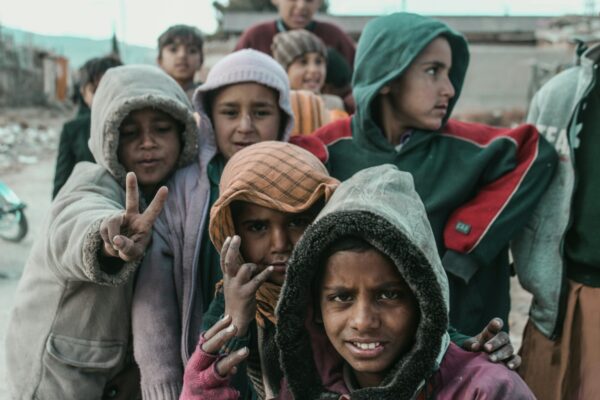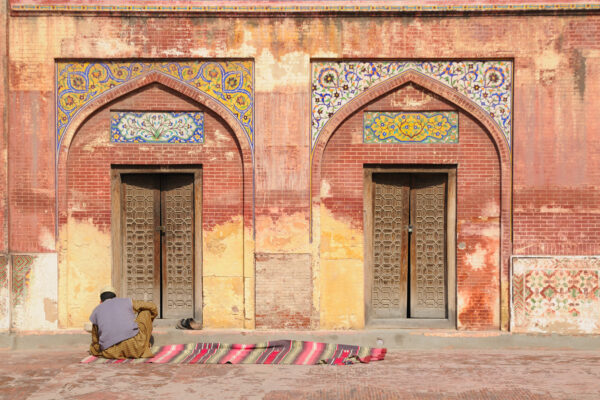At this hospital facility in Wajir, there are only a few beds and no operating room. If Noora needed surgery she would have to travel 4 hours to a bigger hospital in the town.
At this hospital facility in Wajir, there are only a few beds and no operating room. If Noora needed surgery she would have to travel 4 hours to a bigger hospital in the town.
The Muslim Vibe is supporting Penny Appeal’s Fragile Lives campaign this March. Penny Appeal will be providing pregnant mothers, new-born babies, and children with health and nutrition support in Pakistan and Kenya. By raising £2,500 we will support mobile screening services which will reach over 25,000 mothers and babies to screen for, and detect malnutrition. The UK Government will match your donation, helping us to make DOUBLE the difference to mothers and babies in Pakistan and Kenya.
In Pakistan, 400,000 babies die every year before their first birthday. That translates to almost one every minute, and it is a statistic I just can’t get my head around. The statistics from our areas of work in Kenya are not any more positive, and Kenya has one of the worst maternal mortality rates in the world.
Our new project, Fragile Lives, will be providing vital maternal and child health services in Pakistan and Kenya. In Pakistan, we’ll be working in Interior Sindh, while in Kenya we’ll be deep inside two counties, Wajir and Marsabit. These areas are experiencing drought and are marked by severe poverty, a lack of food and water, illiteracy, unemployment, a high infant mortality rate, and a lack of access to quality healthcare. A lot of women deliver their babies at home without trained doctors or clean and hygienic environments. This means that the chance of infection is a lot higher, and if something goes wrong during labour, unskilled persons do not know how to react. The consequences can be fatal.
As part of working on this project, I visited the location sites in both Pakistan and Kenya, and was so overwhelmed by the sheer scale of the issues we are hoping to address.
On the ground realities
Walking into this maternity unit at a sub-county hospital in Wajjr was a far cry from the maternity ward I visited with my friend Layla in London who had a check-up appointment before she gave birth to her first child, Zahra.
I can’t help but draw comparisons to the facilities she had available to her compared to Noora, a 20-year-old I met who is due to give birth any day now.
Layla was monitored throughout her pregnancy, and offered the flu jab and whooping cough injections to protect her baby. Layla knew the names of all the midwives at the hospital, and they all knew her and even knew what pregnancy cravings she was having. Noora hadn’t really been monitored at all, and as a result, she had no idea if she was having a girl or a boy or whether her unborn child was even healthy. When I asked her why she hadn’t been to the hospital for any appointments until now, and she explained that traveling to the hospital and medicines cost money that she simply doesn’t have. Noora’s husband is often away working.
Layla, on the other hand, had attended all her antenatal classes and was armed with knowledge about what was possibly going to happen to her at her birth. She read various books to supplement her knowledge and knew she was in the best hands possible. The doctors had also met her husband on several occasions and talked to him about what to expect during labour and when the baby arrives.
Layla gave birth to a beautiful baby girl, Zahra. She had a complicated delivery and needed last-minute surgery. The doctors acted quickly and effectively. Layla was bleeding excessively and lost a lot of blood, but she was given a blood transfusion quickly. She was monitored for a number of days afterward and given medical care and support around the clock.
The doctors and nurses helped Layla with breastfeeding and explained how to make sure Zahra was feeding well, and what to do if she became unwell. When Layla left the hospital to go home, she was nervous but so excited to begin her new life with her baby girl.
At this hospital facility in Wajir, there are only a few beds and no operating room. If Noora needed surgery she would have to travel 4 hours to a bigger hospital in the town. There is also no blood bank, which means if she needed a blood transfusion, her family or friends would need to donate her blood. The hospital itself was basic and unclean, without any systems in place to stop the spread of disease.
Noora is due to give birth any day. This is her third pregnancy, but unfortunately, her first two children did not survive. Her first child was a baby girl, but Noora delivered at home without the care of a doctor, and the baby was born stillborn. Noora barely saw her as her family rushed the baby away to be buried quickly. Her second child was a beautiful baby boy, who she named Ibrahim. This time, Noora had reached a hospital facility at a refugee camp on the border of Somalia. She gave birth to a healthy child and both mother and child were discharged immediately.
Unlike Layla, Noora wasn’t given much support when it came to breastfeeding. Ibrahim wasn’t feeding well in the hospital, but the doctors assured Noora that he would feed when he was hungry. As time went on, Ibrahim still wasn’t feeding well, and Noora knew something was wrong. She knew her baby boy needed medical help. She was so scared.
Noora and her husband did everything they could to get their baby seen by a doctor, but sadly Ibrahim died on the way to the hospital.
Noora told me how she remembers the softness of his skin and the way he smelt. She just wanted to kiss her baby boy. Today she speaks of how she wishes she could watch him grow up, and all the milestones in his life that never were.
I remember talking to Layla soon after Zahra was born, and she was ecstatic. She was in awe of her baby girl and spent so much time just holding and kissing her. Hannah is growing up in front of Layla’s eyes, and is healthy, active, and flourishing every single day. Noora lives with the memories of her lost babies but with so much hope for the precious and fragile life growing inside of her.
Our mission and goal is to help make sure that women like Noora have all the support they need to care for themselves and their children and to give them the best possible start to life.
Donate before June 9th to Penny Appeal’s Fragile Lives Appeal and the UK Government will match your donation pound for pound to help save even more lives and make double the difference to fragile mothers and babies in Pakistan and Kenya.





